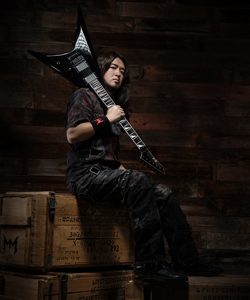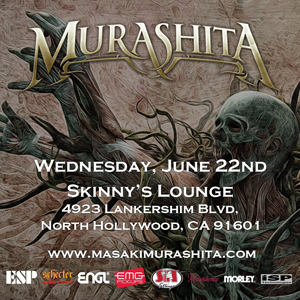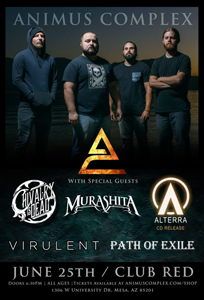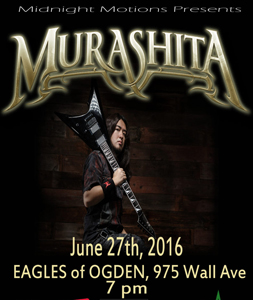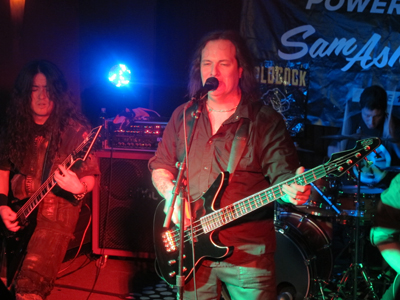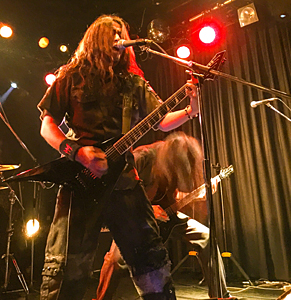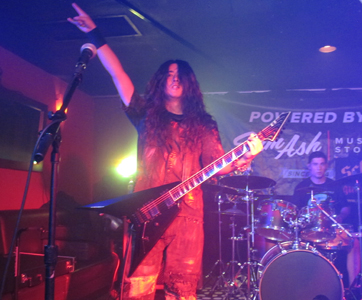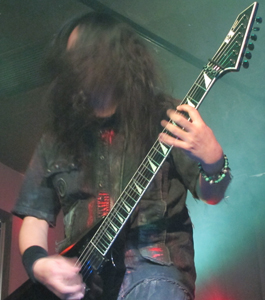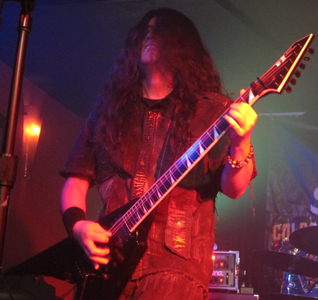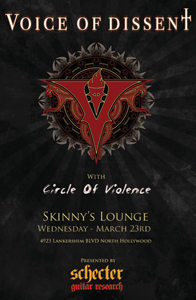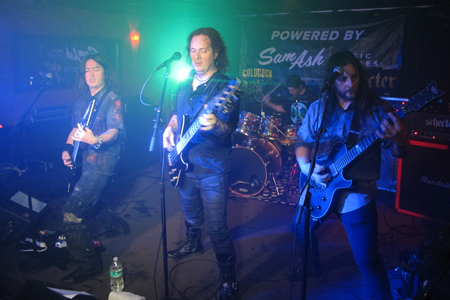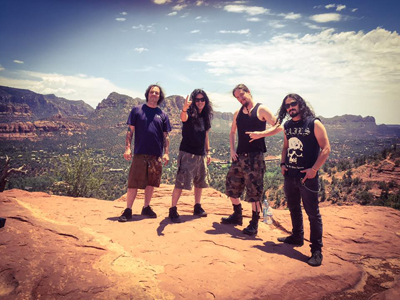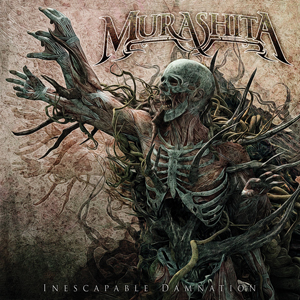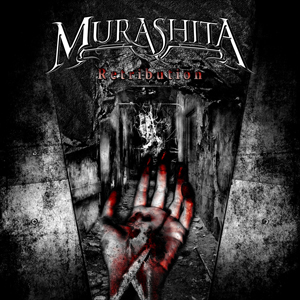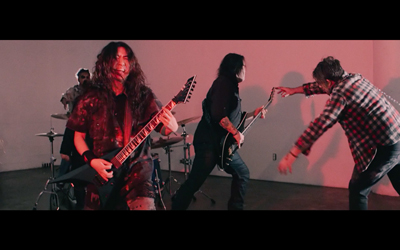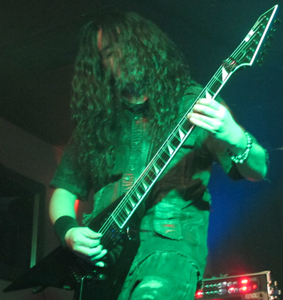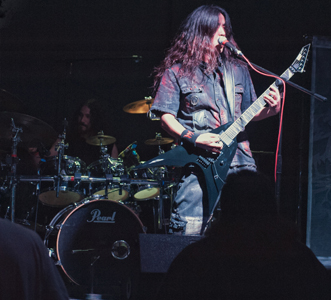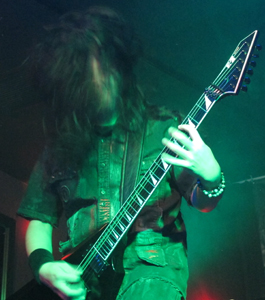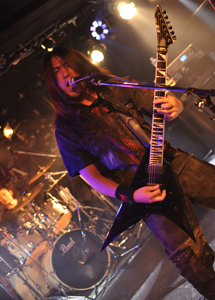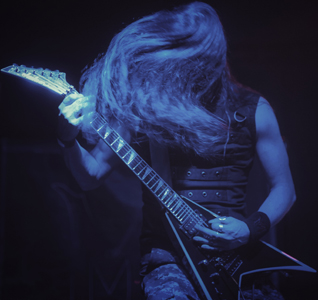An Interview with 'Masaki Murashita'
(Photograph by www.concretegrey.com) Frontman/Guitarist of 'Murashita' & Guitarist/Backing Vocalist of 'Voice Of Dissent' that took place on June 30th, 2016. Interviewed by Glenn Milligan. Glenn: Tell me about the Murashita Tour. What were your favourite parts of it? Masaki: It was awesome. It was definitely one of the best tours I’ve ever done. Great shows, and great crowd especially in Ogden, UT. The people out there in Arizona at the Complex really took care of us well and also Alex of Midnight Motions who put the show on at Eagles Lodge, Ogden, Utah. Everybody who were involved in this tour having us play were very awesome. We are super happy and grateful and had a great time and cannot ask for more. I can't wait to do another one. Glenn: Were there certain shows that stood out at all? Masaki: Yeah definitely. I had a great time. It had to be the Ogden show. Crowd response was best and we sounded best out of three shows and it was worth the drive. The tour started in Los Angeles at Skinny’s Lounge. With this new line-up, Rodney McGlothlin and I had played together in Voice Of Dissent and we did a tour of my band in Japan last year so we already had a working relationship and we’ve been friends for many years now and we have the chemistry. With the new guitarist, Patrick Morton and Chris Aquirre on Drums (he also plays bass for ‘Rattlehead’), they are great players and it’s more exciting having them play with us. It turned out great and now I’m super confident and excited about future gigs.
Glenn: How did you and Rodney first meet? Masaki: Rodney was a DJ for a Metal/Punk Internet Radio Station when I first talked to him. He interviewed me when I was in Hemoptysis and I had a record out at the time to promote. My publicist at the time, Doug connected us and we kept in touch since then. We started talking more and we met for the first time ever at NAMM some time around 2011/2012. I'm a Director of Artist Relations for a pedal company Providence and I was traveling a lot around 2013. Every time I visit L.A. we hung out and I ended up moving here. He had a band (Voice of Dissent) and we started hanging out more. I respected him as a superb bass player and song writer since day one. When the opportunity came to do a tour of Japan he was the first person to give a call to do a tour with.
Glenn: Since you are based in L.A. what do you miss about not being in Japan? Masaki: Food and family. It's so expensive to eat out here in the States compare to Japan, so that's a big thing and not being able to get together with family and close friends often is definitely the biggest thing I miss about not being in Japan. It's nice to be able to call overseas free nowadays. I had to run to the convenience store to get a phone card back in the day to talk to my family. It's pretty awesome, but physically being around them and spend time together can't be replaced.
Glenn: You play an interesting style of music, it’s been called ‘Melodic Death Metal’ – it’s that how you consider it? Masaki: Well you know, there’s so many sub-genres it’s getting ridiculous. Glenn: It is. Masaki: I do what I want. That’s the thing. I’m not trying to be somebody else. I do whatever comes natural to me and what I feel. I like this stuff. It’s how I put it together and compose it in the song. I get a lot of references a number of times. It’s interesting to see how people react to my music. Glenn: What would you say the highlights of your musical career so far are in either band you have played in? Masaki: I’d say played shows with Sepultura & Hypocrisy. There were many national acts to open for with my previous band. One of my absolute favourite was D.R.I. They are great people and put out awesome shows. I talk to Spike Cassidy every once in a while. He is such a nice guy. They are the pioneers of this whole Thrash Metal crossover thing back in the day. They just put out a new record and I am so happy for them. Every time we play with D.R.I. the crowd are going nuts. It’s like stage diving and a huge circle pit. I don’t know where they’re coming from, but I love playing in front of D.R.I.'s crowd. They are awesome. I enjoyed every minute of those shows. There was one show where we opened for D.R.I. and I saw some blood on the floor and the security guy was mopping it off the floor after our set. That was so metal!
Glenn: Is it kind of strange because your are in a band with Rodney and you’ve also got Rodney in your own band. Do you get together and think, ‘Which band is this one?’ Then the other members turn up and you think, ‘Oh it’s this band right now!’ Does it feel kind of odd that you are both in both bands? Masaki: Well I actually enjoy playing in ‘Voice Of Dissent’. The reason is, not only do I believe in Rodney’s music – he’s an amazing songwriter and musician but also it’s the stuff I like playing. I enjoy the music and also it’s a great experience for me as a guitar player. I’ve never played in somebody else’s band. I’ve always been the main songwriter. This is the first one. It’s a great experience for me to learn somebody else’s style and actually pushing me as a guitarist. I think I’m becoming a better guitar player. I never consider myself as a lead guitar player. There’s some fast licks and I thought ‘Oh sh*t’ but I spend a lot of time working on his stuff. It’s definitely a great experience for me and we are trading each others talent for each other’s bands. It’s great. I really enjoy it and happy to be working with Rodney.
Glenn: I guess it gives you chance to relax and just play guitar and let Rodney take over on vocals and you come in when needed on back-up vocals. Then when it comes to your own band, you’re on the vocals. Masaki: Exactly. The thing is, when I’m playing in ‘Voice Of Dissent’ I’m not in centre stage and stuck in front of the mic. so I have more freedom to move around the stage. That as the whole thing that I wanted when I actually started playing. I never wanted to sing, I never wanted to play lead. I just wanted to play on stage and jump around and have a good time. Even though I still play lead and do the back-up vocals in ‘Voice Of Dissent’, I still have freedom and I can actually move around. That’s one of my favourite things of being in ‘Voice of Dissent’. Glenn: That came across a lot when you were on stage because it was great to photograph you due to it being visually interesting. You weren’t some guy with his head down and just and not having any interest. You make it more of a spectacle and make it far more interesting to listen to and to watch and take photos and everything else. It’s like you make it and you can tell that you are emphasising the music and it’s really part of you and you’ve got such a passion to do what you do onstage as well. Masaki: Thank you. Yes, absolutely. Since it is live, I like music and it has to be something meaningful for the people actually to spend money and time to come up and see the band. For me, it’s interacting with the audience and delivering good, big energy and passion to the audience. It’s a big thing. I’m not just standing on stage and playing and singing, I’m interacting with the crowd and the band mates on stage. The show is also a visual thing and experience. That’s a good thing with the crowd head-banging and moshing and having a great time. That’s what I’m going for. Glenn: That must have been pretty breath-taking on tour when you were stood on that mountainside in Sedona? Masaki: Yeah that was fun. We needed a little break on the trip. One of the things I try to do if we have a little time, just find a beautiful sight and relax for maybe 10 or 15 minutes because long driving is brutal. We drove almost 15 hours that day so instead of just sitting in the car for an entire 15 hours, I thought it would be a little treat for the guys to see a beautiful sight and get fresh air and vibe, since we drove all the way there. It takes about 8 hours from L.A. to Sedona. We don’t get to visit there often so I thought it was fun and the guys were happy about it. We had a great time and wherever we got to we love to do this kind of stuff.
Glenn: That’s great. On your E.P. 'Inescapable Damnation', Dave Ellefson has a guest spot on it. How did that come about having Dave Ellefson there? Masaki: I have known him for almost nine years. When I was in Arizona I got to know him and saw him on many occasions. Obviously, Megadeth is a huge band and I grew up listening to them and they are my biggest influence. They are one of the reasons why I picked up the guitar. I was in shock when he said yes when I asked him to play bass on one of my songs. You never know until you ask. I just asked if he was interested in doing this for me and he said he’d do it and it was like ‘Wow!’. So it was pretty cool to have him on it. It’s such an honour. An incredible honour to have him play on one of my songs. Kelly Conlon (Death/Monstrosity) in Arizona too, I’ve know him few years. I’ve shared a stage with him in bands he was in at the time when I was in AZ. I wanted to work with somebody like Kelly because he’s a great bass player needless to say and he’s the pioneer of bass playing in the Death Metal scene in Florida with Death. When I was recording his bass, I thought ‘Wow!’. It’s brutal and crazy and he did something really interesting that I never thought of. We had a great time in the recording session. We both put out great ideas and it came out great. I’m super happy how it turned out. I’m still in touch with him and we will see if we can do some other stuff together in the future. When it comes to Rodney, he’s a local guy in LA and he is my good friend. I wanted to feature him on some of the songs. I respect him as a bass player like I said earlier. It was easy sessions, he did outstanding job. Kevin Talley (Suffocation/Six Feet Under/Chimaira), it’s interesting because I just simply reached out to him to see if he’s down to do some drums. It started from ‘Retribution’ and I wanted to see what he does. I’ve never worked with Kevin before or even other drummers. I wasn't used to working with other drummers and what he did with the ‘Retribution’ track… I was like ‘Wow! He’s such a solid player. I was impressed with what he did and so excited and happy that I decided to go with Kevin on the whole E.P. playing drums and it turned out great. I haven’t decided what I’m going to do with the next record yet with a limited budget being unsigned. I may have Kevin again but whatever makes sense the most with the budget I have and the environment and situation and see what happens.
Glenn: The title of the CD ‘Inescapable Damnation’, what influenced it? Masaki: Well the whole record is basically from my past experience over the last few years. Everything that I went through. I lost the band, so many people left me, etc. All the other difficult things I went through in the last few years. I moved here and tried to start anew but it wasn’t as smooth as I wanted it to be and through all the frustrations at the same time I didn’t give up. I could be all negative but I wanted to turn negative stuff into positive. Like some past anger and frustration can easily go to negative or self-destruction or misery or other stuff but I was not done yet. I’ve got to do this and this is what my passion is. This is what I want to do and I will basically leave it for the people. That’s kind of the whole concept and sometimes the songs like ‘Conquer The Foe’ – it’s about the biggest enemies are within yourself. Emotion is very scary because it can kill you and it can also kill somebody else. You have to keep it all under control and things are all depends on how you take it. Turning negative into positive. ‘The Show Must Go On’ is the same kind of concept. I wanted to encourage people who has passion to achieve something but going through struggles. As long as you keep trying hard and don’t give it up, there is a chance. Once you’ve thought of how it’s done and work hard. Even in ‘Inescapable Damnation’ the same thing. This is encouraging people from my experience. It’s turning negative energy into positive with vibes. A lot of the metal stuff is becoming bitching and whining nowadays but instead of that Metal Heads used to be working together to speak up and fight to get what they want. You’ve got to earn it instead of just sitting and bitching and whining about things and waiting for someone to give you free sh*t! We have to earn it. Glenn: I noticed in the video for ‘Conquering The Foe’, you’ve got a zombie in it. Who plays the zombie and where did that idea come from to have the zombie in the video? Masaki: That’s our Producer, Matt Zane. That’s his idea. That’s what I usually do when I actually make a music video. I let the Producer and Director listen to the song and have them to come up with the ideas and concept. They know what they are doing and they can be really creative in what they do. Just like making a record with a Producer, having outsider to bring fresh idea is a good thing. Definitely I didn’t have that zombie idea. I thought, ‘Alright, let’s give it a shot’ and basically the zombie is the conquerer and at the end of the video I ‘conquered the foe’. We had a great time at the video shoot. Usually the video shoot is just exhausting – hearing the same song over and over and get sick of it, but everyone was having a great time at the video shoot. Surprisingly it was really fun. It turned out great and I loved working with Matt Zane. He is super professional and a great guy. He’s also a brilliant musician and frontman for Society 1.
Glenn: How is it going regarding the distribution. I noticed you have got Nuclear Blast in Europe and Plastic Head in the UK. How is that all going for you? Masaki: Yeah. It’s doing well. I got this stuff took care of it when I was in Japan while I was on tour. We started talking about the distribution with Plastic Head and we ended up releasing the record late January/February. It’s great to have the record distributed especially in Europe where people still care about the physical copy. The distribution of the E.P. is D.I.Y. through Plastic-Head. Glenn: Over in Europe and over in the UK, it’s pretty well spread the styles of music especially when it comes to Rock & Metal. Everyone seems to do okay. There are so many different types of fans over here as well. It’s not like one or the other. They will go and check things out so it’s good you’ve got the distribution in both parts. Do you have plans to come across here to do some UK or European shows in the near future? Masaki: Absolutely. I’d love to. I need to do it and I’m looking forward to playing Europe. I’m open to tour in Europe or elsewhere. I love Europe. Hopefully I’ll get to do a tour over there soon! Glenn: Cool. I’d come and see you. What guitar pedals do you like using a lot? Masaki: I use Providence delay and chorus, ISP monitors for the noise gate and I control everything with the Providence switcher and just program everything to that. No tap-dancing on stage.
(Middle Photograph by Eyeful Images Photographic Arts, LLC.) Glenn: What are your current and future plans for the band? Are you still deciding what you are going to do next with a new album? Masaki: Yes. I’m already working on the next record. I’ve just started writing and now I’m back home so I’m going to spend more time writing the next songs. In the meantime, keep promoting and hopefully more people will give us a listen and spread the word and we get to play in many different places. Glenn: If you had the chance to play alongside any big bands with ‘Murashita’ or even ‘Voice Of Dissent’, who would those bands be that you’d love to do festivals with or tour with and why? Masaki: I would say Arch Enemy, Megadeth, Kreator – that would be great because I get a lot of people saying that we’d be a great fit with those bands and to see how the audience reacts. That would be the bands or Carcass. Some melodic death or those kind of bands. I would love to play with them. Glenn: When you went over to do the tour of Japan, did you find the fans were different when you compare them to the fans in the USA? Masaki: Yeah. They are more crazy in one way. You wouldn’t expect somebody like a person who listens to metal is actually coming out to the show and banging their head and buying merch whereas here you can basically smell whether the person is a metalhead or not. Let’s say you are walking in the street and you see a Metal Head guy walking, you know from how he looks he must be a Metal Head. You can smell that but in Japan they absolutely don’t look like a Metal Head. It tends to be, “Oh you’re a Metal Head? Oh cool”. At shows you see a guy in a suit coming out to Metal shows which doesn’t happen here. I thought that was pretty interesting.
Glenn: I bet that’s really strange isn’t it. It’s like they’ve took a wrong turn because they looked like they were meant to walk into a bank or something. It must have seemed so bizarre. Incredible when you think about it. How are the bands in Japan that you played with? Masaki: There are many good bands there. That’s for sure. They can definitely play and they do something different than what American bands do. When it comes to Japanese bands, they definitely have different influences from different types of music there than most American bands. It’s a whole different thing. Americans tend to be more conservative – definitely different. Glenn: If there is anything else you’d like say to as the final words for the Interview? Masaki: Yeah. Thanks for interviewing me and I appreciate your readers for taking a look at this interview. Glenn: Thanks. You take care of yourself and have a great day. It’s been a pleasure talking to you. Masaki: Thank you. You too. Glenn: Thanks Brother. Masaki: Excellent. Likewise. Glenn: See you in a few months. Bye. Masaki: Bye-bye.
(Photograph by Eyeful Images Photographic Arts, LLC.) Feel free to check out the following web links: |
